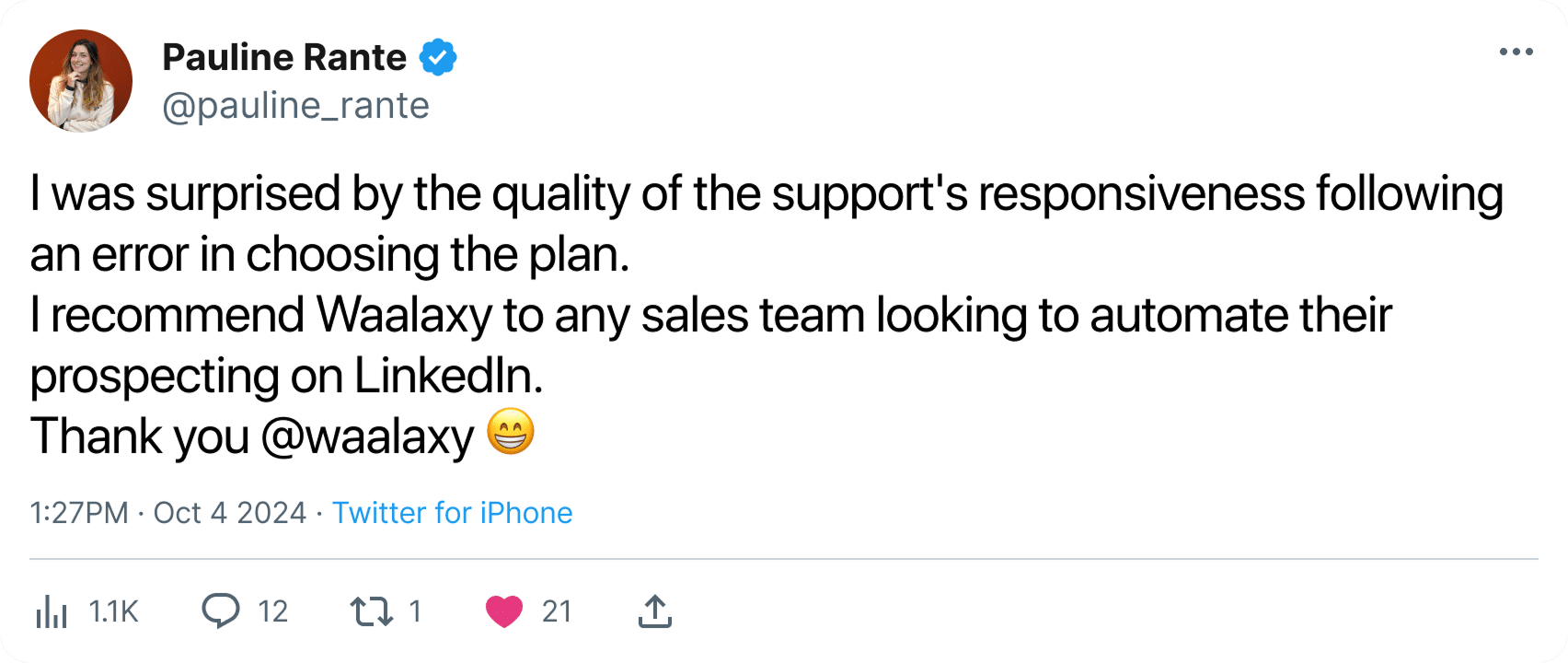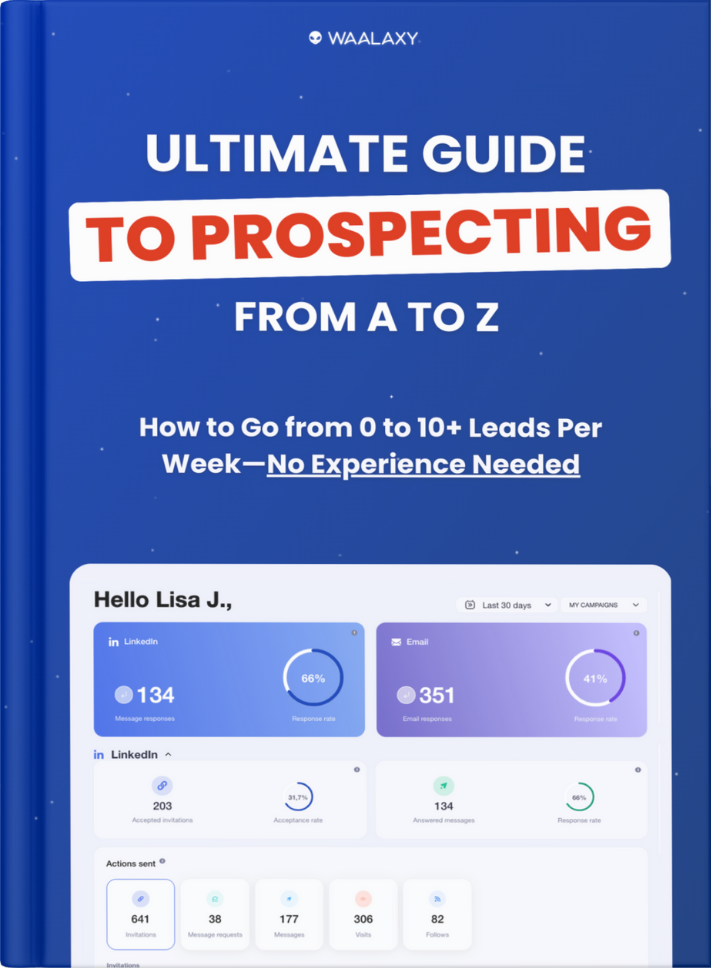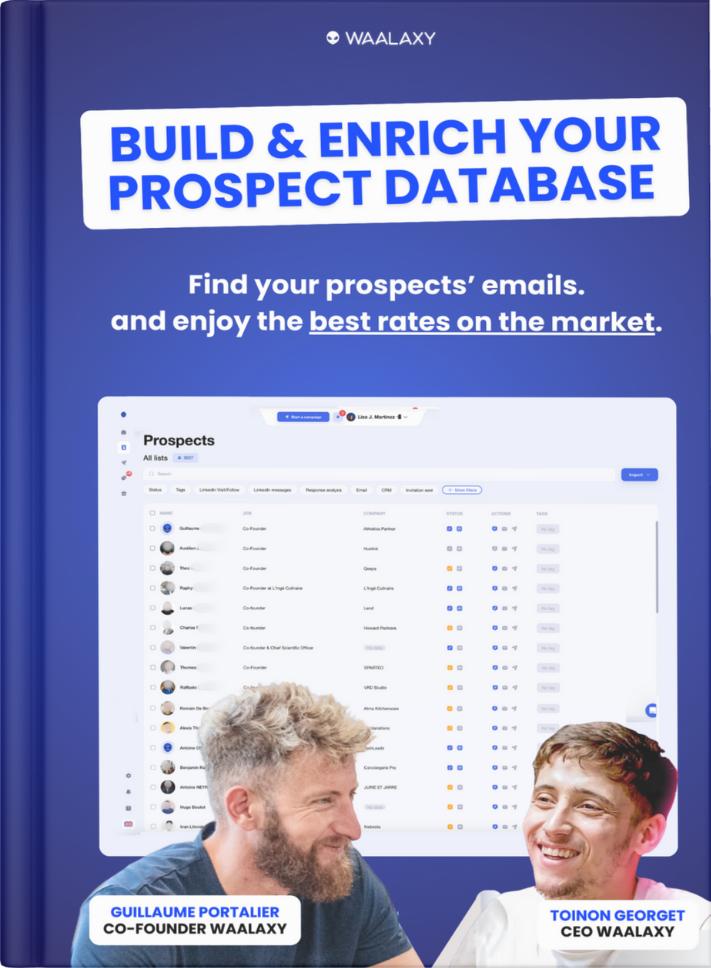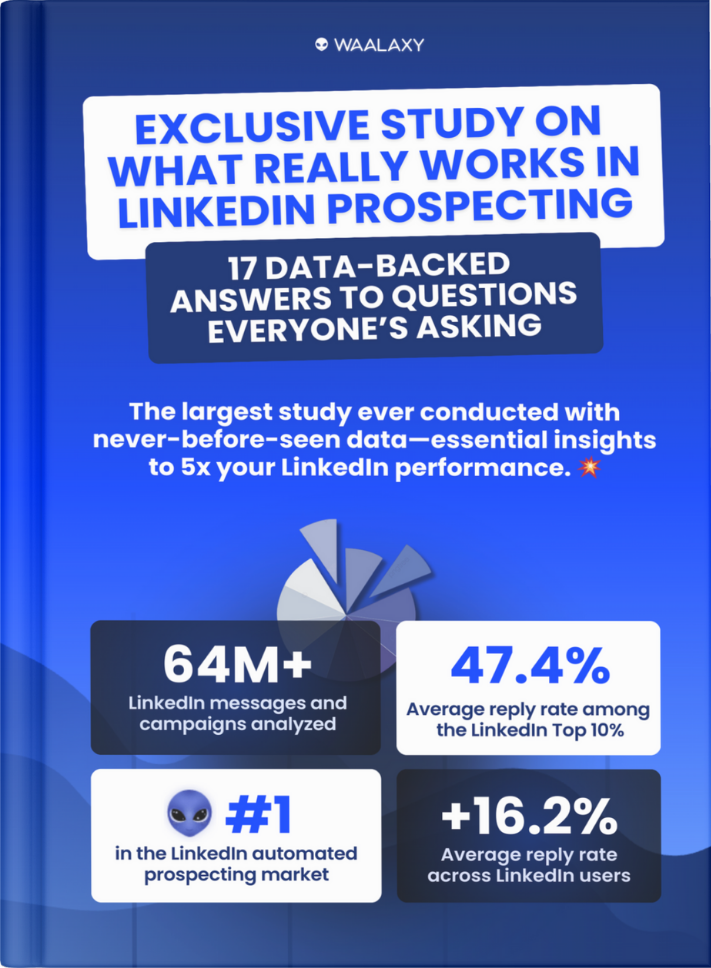- Marketing Automation’s Definition
- Marketing Automation’s Set Up
- Marketing Automation’s Benefits & Drawbacks
- How Do You Get Started With Marketing Automation?
- What Is A Marketing Automation Tool?
- How To Choose Your Marketing Automation Tools?
- Top 8 Best Marketing Automation Software
- How do I use Waalaxy?
- Conclusion
If you have a predominantly online business 👨🏻💻, marketing is essential to get your name out there. 👀
The problem? You have to do the same things over and over again. You get bored and sometimes even lose track of what you’re doing… 🙄
The solution? 💡 Marketing automation. And, just as well, because we’re going to talk about it right now.
On the agenda ⬇️ :
- Marketing automation definition.
- The fundamentals of marketing automation. ✅.
- The benefits and drawbacks of marketing automation.
- Best practices for starting up marketing automation.
- Definition, criteria and Top 7 best marketing automation tools to use.
- Using Waalaxy and campaign examples.
Let’s get started! 🚀
Marketing Automation’s Definition
Simply put, marketing automation is a marketing technique that uses software to automate and optimize repetitive tasks. 🔄
💡 We’re thinking, for example, of activities such as:
- The sending of emails 📩.
- Managing social networks.
- Personalizing customer experiences.
- Measuring the results and segmentation of your database.
🎯 The main aim of automation is to free up time for marketers so they can focus on strategic missions, such as:
- Creating marketing campaigns.
- Generating qualified leads.
If you didn’t know, marketing automation software uses customer information such as purchase history 💰 or their consumption habits so that you can create an outstanding conversion funnel. 👌🏼
This works well because the error is reduced. You need to set up scenarios (also called Workflows) that will be triggered when the user performs an action. 🤖
We won’t hide the fact that this is a key element 🗝️ for companies looking to improve their efficiency and/or profitability.
Marketing Automation’s Set Up
Are you hot 🔥 to implement marketing automation?
Good idea because it’s a solid foundation for your marketing strategy💡which allows companies and freelancers to manage and automate marketing actions such as:
- Managing customer databases.
- Sending automated emails.
- Segmentation of your mailing list.
We’ll explain in detail the steps you need to take to guarantee optimal results:
- Define your objectives ✅: as with any strategy, you need to define clear, measurable objectives that you want to achieve with marketing automation (increasing conversion rates, customer loyalty…).
- Collect data : build up an exhaustive, up-to-date database of potential users.
Segment your mailing lists 📄: divide your leads into segments according to predefined criteria (interests or purchasing behavior for personalized communications). - Select or create your ⚙️ scenarios : develop a series of automated communication actions based on prospect and customer behaviors (e-mails and personalized messages on social networks).
- Test and optimize 🧪: once your scenario has been set up, you’ll need to test these through one or more A/B tests, to adjust and improve them afterwards.
- Follow up & Tracking ↗️ : to get a clear picture, evaluate performance regularly, and don’t hesitate to abuse dashboards.
Now that you know the essential steps involved in setting up marketing automation, you should also be aware of the pros and cons of this strategy. 👇🏼
Marketing Automation’s Benefits & Drawbacks
🎁 We can assure you that implementing marketing automation will completely change your life! ✨
Here’s a list of the various benefits you can gain from marketing automation, whatever the size of your business:
- Increased efficiency 🧠: save time and reduce time spent on tedious tasks, while boosting your productivity.
- Optimal personalization: adapt and personalize customer experiences based on their online behaviors📱 and purchase history.
- Improved lead quality: track their activity to better target qualified leads and increase your conversions.
- Measuring results: assess the effectiveness of your actions/campaigns with integrated results analysis, so you can make informed decisions.
- Strengthening customer relationships: free up time to focus on your customers 🥰 and develop lasting relationships through effective personalization.
- Optimization of resources: focus on high value-added missions to earn money 💰.
In short, with marketing automation, you’ll gain in efficiency, customer relations as well as sales results. 🤑 It would be foolish to do without it.
But while there’s nothing insurmountable about it, not everything is rosy… 🌹 Here are 3 challenges most commonly found with marketing automation:
- Complexity of tools: some can be difficult to configure and require in-depth understanding for effective use.
- Data quality 💎 make sure it’s accurate and complete enough to effectively segment your campaigns.
- Privacy: comply with regulations such as the RGPD and ensure full transparency🚰 in data collection and use.
We advise you to consider these challenges when embarking on marketing automation (to minimize risks and maximize results). 🏋🏽
How Do You Get Started With Marketing Automation?
Since you want to implement automation in your marketing strategy, we will explain how to do it, so that you can start on the right foundations. ✅
Even if there seems to be a lot of information, don’t worry, everything is super easy to do. 😇 Come on, let’s get started.
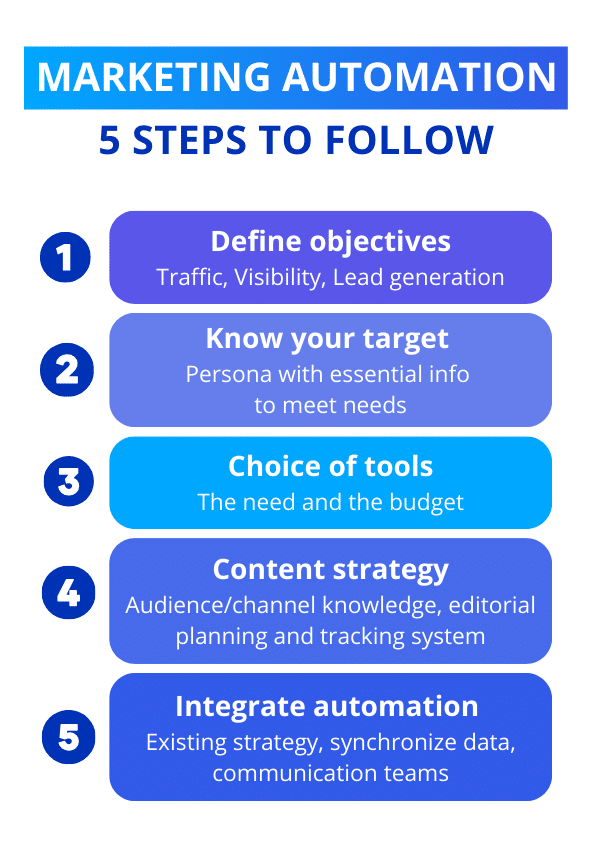
#1 Define Your Goals
You need to ask yourself a significant question ❓ before you take the plunge: “why do I want to implement a marketing automation solution?”.
👂🏼 There are, of course, several answers that will depend on you alone, but it could be to:
- Improve communication.
- Gain visibility.
- Attract traffic to your website.
- Build a multichannel approach.
- Generate more leads.
The answers you give to this question are essential 🤩 so you know which solution to choose.
#2 Know Who You’re Talking To
And yes, we come to the famous 🎯 target question. Are you doing this to relieve your team or perhaps yourself, or are you doing it for customers?
👤 Either way, you’re going to need to put a name to the people you want to target, as well as several other elements to establish a persona.
But what exactly is a persona? Quite simply, the ideal portrait of your customer. You’ll need to gather information such as 👇🏼:
- First and last name.
- Age.
- Location 📍.
- Marital status.
- Her needs.
- His frustrations.
- The channels he prefers to use.
- The buying behaviors he adopts on the web.
Knowing your target will enable you to send the right message 📩 to your audience. That’s why it’s vital to know who you’re selling to.
#3 Assess Technology Needs
Once you know who you’re talking to and have your various objectives in mind, you’ll think about what technology you’re going to use. 🧠
These must be in line with your objectives and your budget🫰and finally, they must be compatible with your own infrastructure.
As you’d expect, there are a number of solutions 🎊 that allow you to implement your marketing automation strategy. Among the best known, you can use:
- Marketing automation platforms, with full functionality (we’ll go into more detail later).
- CRM tools.
- Analysis and tracking solutions.
- Social network activity management software 📱.
- Some email marketing platforms.
For more details, stay with us as we present our selection of must-use marketing automation solution at the end of the article! 😉
#4 Implement a Content Strategy
When it comes to marketing automation, creating an effective content strategy is a key step 🗝️ to your success. Of course, these objectives must be aligned with your goals 🎯
To do this 👇🏼 :
- Get to know your audience. Yes, we’re back to the persona. But that’s to be expected. After all, you need to understand your potential users’ needs and what drives them, so you can offer them something that interests them.
- Determine your distribution channels: where is your audience most active online? On social networks📱?
- Create an editorial calendar: plan in advance what you want to publish and how often.
Measure your results and take a step back. 👀
#5. Marketing Automation’s Integration
The final step in this process is to integrate your marketing automation into your overall strategy to maximize the benefits ✅ of automation. Here’s how to do it:
- Step 1️⃣: Choose a strategy consistent with your customer typology and the type of content on offer. The messages 📩 you send must be aligned with the business objectives you’ve set yourself.
- Step 2️⃣: Synchronize your data with your marketing tool.
- Step 3️⃣: Evaluate and optimize your campaigns by monitoring their performance and optimizing them according to click, conversion and opening rates.
- Step 4️⃣: Don’t forget to communicate with your teams (if any). Working together will help you maximize the benefits of marketing automation.
By following these steps, integrating automation should be child’s play. 👧🏼
On the other hand, we’re going to give you a little help when it comes to assessing your technological needs and choosing your marketing automation software.
What Is A Marketing Automation Tool?
Marketing automation software is a tool that automates repetitive tasks. 🔄
🎯 Its main objective is to help generate, nurture and convert leads into customers. By improving the effectiveness and efficiency of marketing campaigns and enabling a personalized customer experience.
👉🏼 To go into even more detail, they integrate functionalities to perform :
- data collection,
- database management,
- selection of automated scenarios for multichannel prospecting,
- management of personalized message campaigns,
- segmentation of audiences and lists, tracking of online interactions and behavior,
- creation of landing pages and newsletters,
- dashboard-based performance measurement and analysis,
- integration with other software you use (CRM, social networks, reporting, A/B testing…).
- and much more, depending on the solution you choose.
These features are designed to facilitate your marketing and optimize the ❤️ relationship with your customer or user by adapting to their behavior.
💡 Finally, we remind you that, of course :
- Some features may vary from one marketing automation software to another, but in the majority of cases, we’re going to find similar elements.
- Don’t forget that your customers are real human beings.
To help you make the right choice, here are a few key criteria to consider when choosing your marketing automation tools. 🛠️
How To Choose Your Marketing Automation Tools?
There are so many marketing automation solutions out there, it’s not always easy to make your choice.
We recommend that you pay attention to the following criteria.
- Your needs 💪🏻: Choose software that precisely meets your needs, not overloaded with unnecessary options and features. Take the time to identify what you absolutely need to be sure of selling your products or services! Of course, you’ll also need to know: the number of users, the context, the expected budget… 🧐
- Features ⚙️: Make sure the solution you choose offers a range of features to suit your chosen subscription (with a free trial, it’s always better).
- Price 💵: Test before you commit, thanks to the trial periods often offered, especially if the subscription cost is high (to ensure your investment).
- Ease of use ✅: Opt for software that’s easy to learn, adapted to your level and use, to avoid wasting time understanding it.
- Third-party tools integration 🛠️ : Check whether the solution can be synchronized with other software you use, to optimize your efficiency and save you time.
By following these tips, you’ll find the ideal marketing automation solution to optimize your efficiency and results.
We’re here to help you even more, with a selection of the best marketing automation solutions you absolutely must use/test. 🤩
Top 8 Best Marketing Automation Software
To save you time, here’s a brief overview of some of the marketing automation software you may find useful. ⚙️
#1. Hootsuite, for social media planning
This one is pretty 🎀 famous and is one of the most powerful. ⚡️
Hootsuite software allows you to schedule your posts on different social networks 📲 like:
- Instagram,
- Facebook,
- Twitter,
- Pinterest.
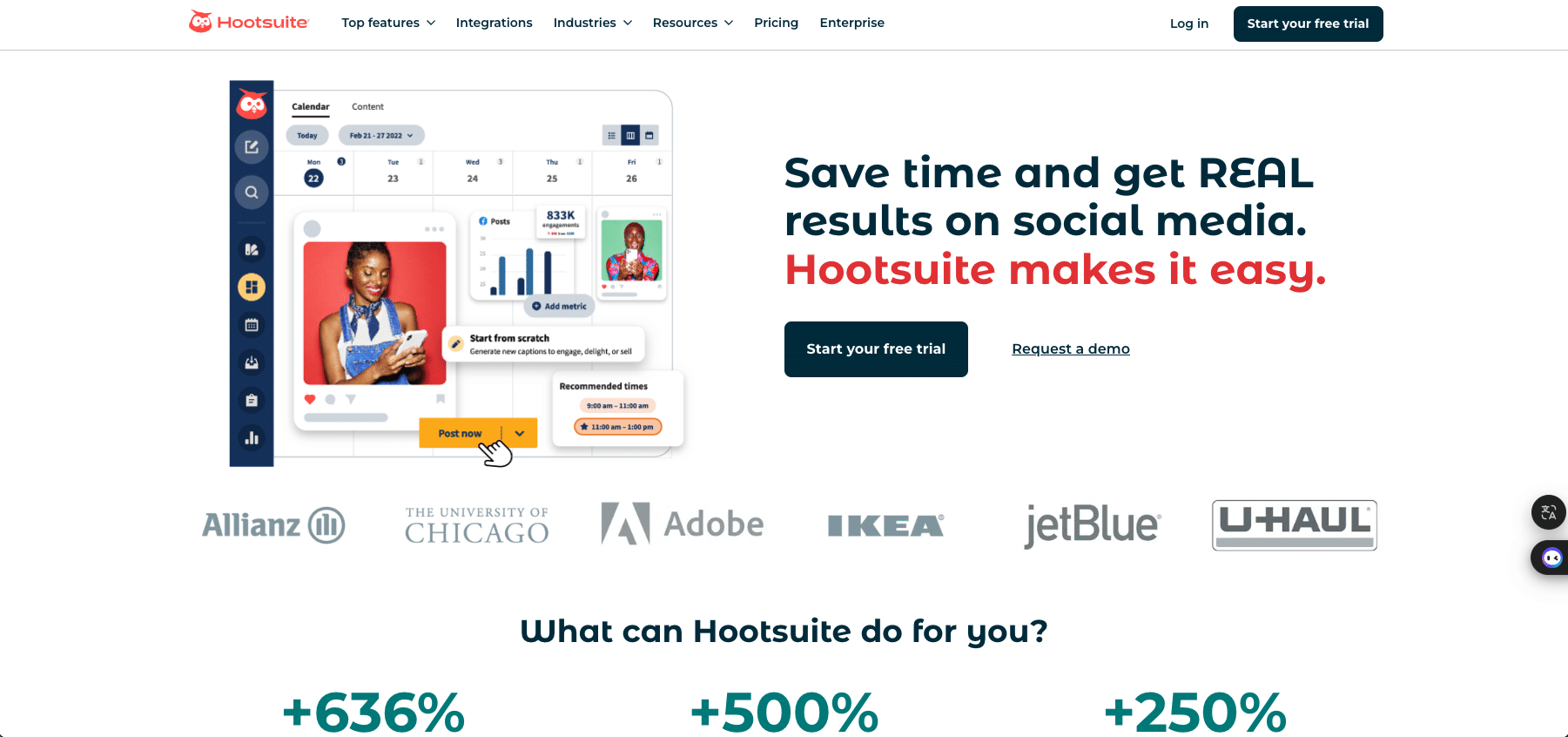
📊 From its dashboard, you can analyze your publications since you have access to the number of views, comments, shares, and you have the ability to reply to comments and messages directly from the platform.
#2. Hubspot, for your marketing campaigns
HubSpot is a full-featured inbound marketing tool, suitable for team use, offering a complete solution for your diverse marketing needs. This platform can ⬇️ :
- Automate your email campaigns with intuitive workflows.
- Move prospects through your marketing funnel
- Generate qualified leads.
- Create without coding.
- Use triggers and conditions to send targeted messages.
- Align workflows with specific objectives.
- Perform A/B tests to optimize your actions.
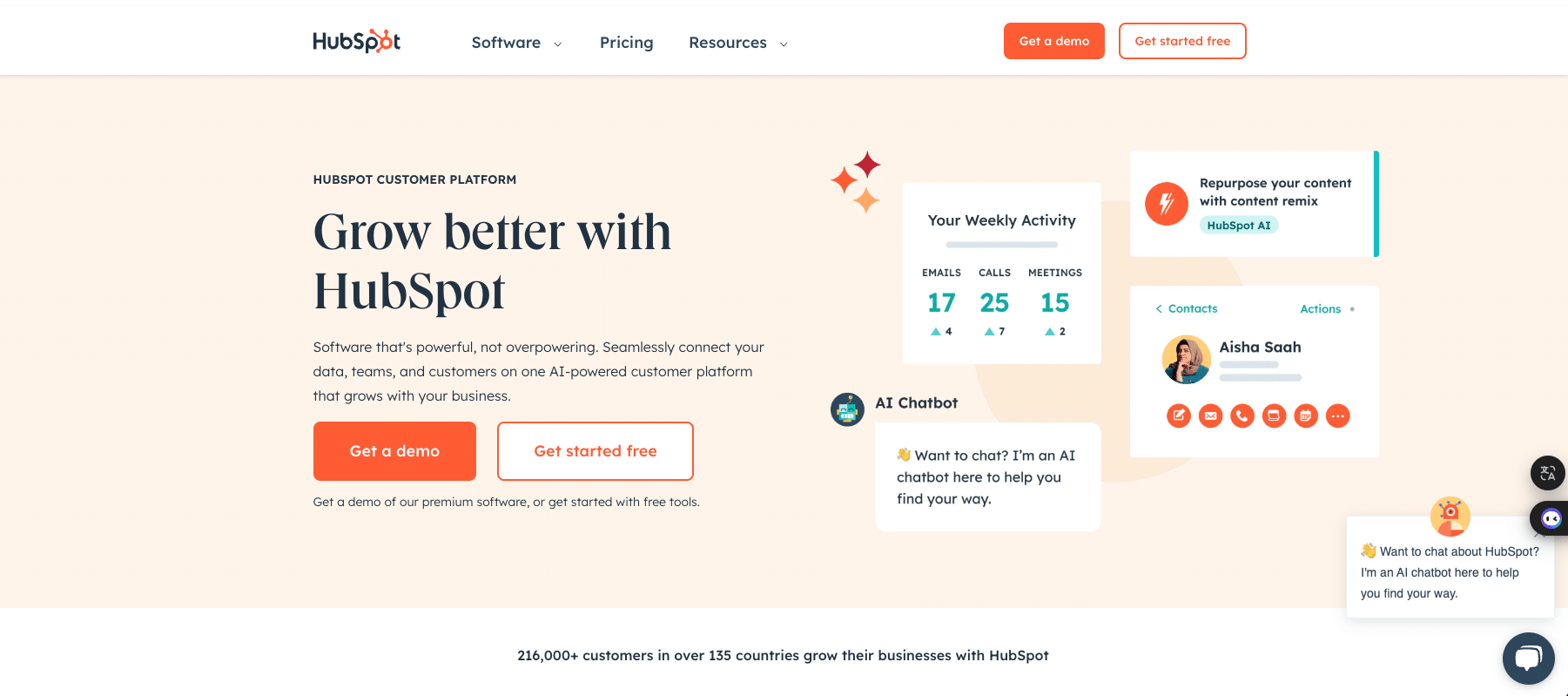
🤑 Three different plans are offered (Starter, Pro and Enterprise) with varying capacities depending on the number of contacts (from 1,000 to 10,000) and prices ranging from €41 to €2,944 per month.
💡 The latter two offer more advanced features than the Starter plan, such as: CRM integration, lead generation optimization, and social network behavior analysis.
With HubSpot, you’ll be able to add forms, understand your potential users, view their social media behaviors…
In short, it’s a good partner for boosting your marketing operations, increasing website traffic, and launching effective inbound marketing campaigns. 🤝
Of course, there are many others. The very long list includes: Marketo, Pipedrive, SalesNavigator, LeadGibbon, Hunter, ZeroBounce… And many more!
#3. Zapier, for synchronization
Zapier is an indispensable tool for connecting different applications. 🔗 You can, for example, act to have attachments from a received email automatically uploaded to Dropbox. 📦
What’s more, Zapier is compatible with numerous applications, such as:
- Gmail,
- Slack,
- WordPress,
- Mailchimp,
- Google drive,
- Trello,
- Waalaxy. 👽
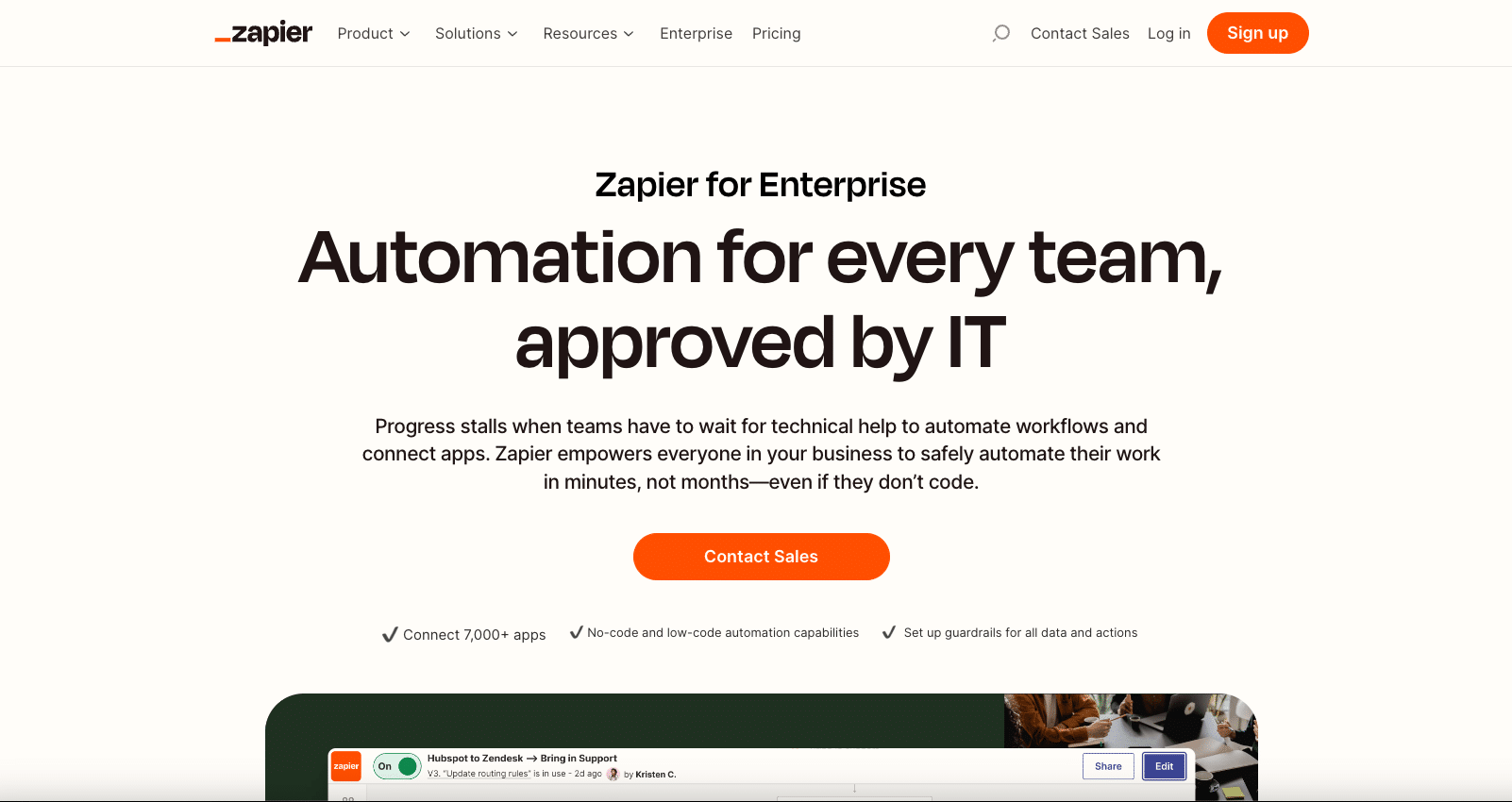
#4. Albato, for full-stack automation
Albato is a powerful no-code integration platform that helps you automate workflows across your favorite apps.⚙️ Whether you’re syncing data between your CRM and ad platforms, managing leads, or triggering AI actions based on form submissions, Albato makes it fast and intuitive. 🚀
Some highlights of Albato include 👇🏻 :
- A no-code visual builder to create and manage automation scenarios — a drag-and-drop interface currently in development to further enhance usability.
- Advanced data transformation tools with conditions, formatters, and branching.
- Rapidly expanding library of integrations — while offering fewer apps than platforms like Zapier, Albato’s catalog is constantly growing and already includes AI tools, Google services, and 800+ apps.
- Support for custom API integrations, webhooks, and data enrichments.
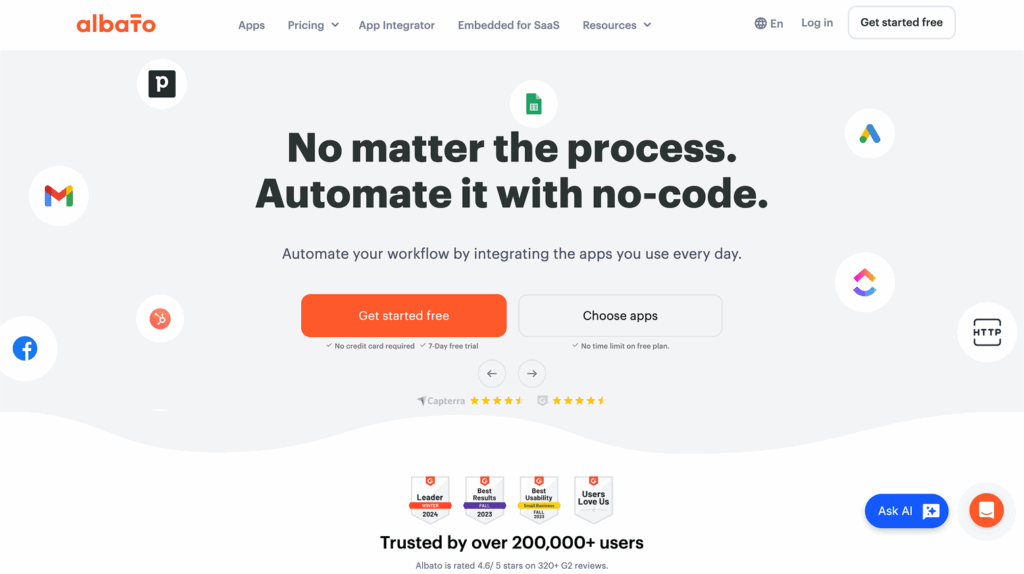
Albato helps you automate the entire marketing journey—without writing a single line of code.✨
Some topics you can address are the number of integrations (we have fewer apps than Zapier, for example) and the drag and drop interface that is not yet available. 👀
#5. KPulse, management and billing CRM
💥 Kpulse is a multitasking CRM that automates a number of actions. The tool is intuitive and comprehensive enough to manage several administrative aspects quickly, including:
- Invoicing.
- Electronic document management.
- Ticketing and customer support.
- Product and inventory tracking.
🤑 If you’d like to try it out, don’t hesitate: you’re entitled to 15 days free and you benefit from a Freemium plan (ain’t life grand?).
#6. MailJet, for email automation
When choosing a marketing automation tool, don’t underestimate email 📩 it remains an essential and effective digital marketing tool for maintaining conversations with your users.
🤖 In digital marketing, using automation for a multichannel approach, makes it easier to contact prospects and thus optimize the chances of reaching them.
It can be used to ⬇️ :
- Welcome a new customer.
- Present a new offer (newsletter).
- Remind them that they have items in their shopping cart 🛒.
What’s more, automated emailing offers several advantages ✅ :
- Advanced personalization of messages according to audience.
- Scheduling of reminders in the event of non-response after a certain time.
💡 It’s advisable to send several succeeding emails to increase the chances of opening and response. After several unanswered mailings, you can initiate a contact on LinkedIn, which will increase your visibility with your leads on different channels.
🧊 Starting with cold mailing is important, as it can facilitate subsequent exchanges on LinkedIn, since you’ll benefit from the prior recognition of your community.
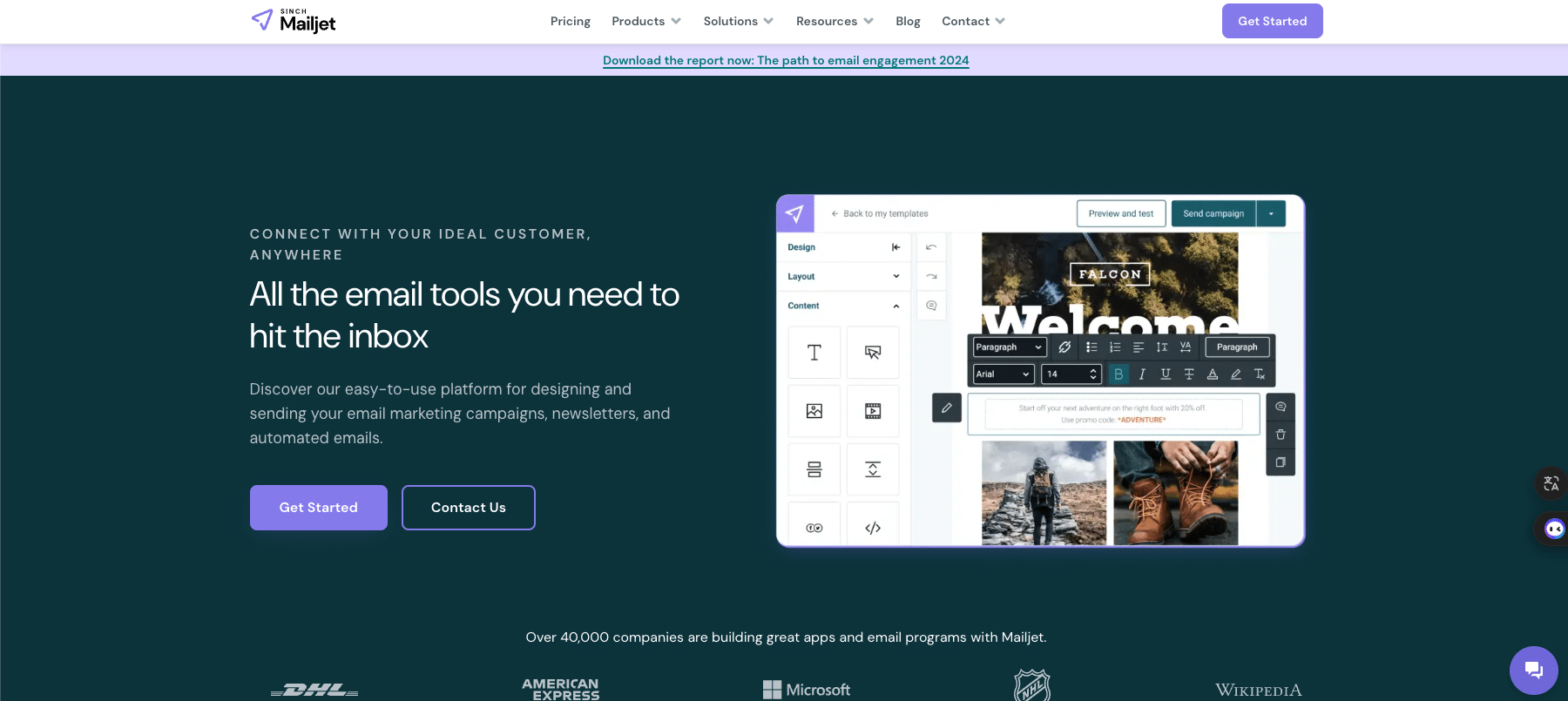
To make your choice easier, we present the MailJet tool! 🛩️
Mailjet makes it easy to create and send emails without requiring programming skills. 🤗 You can design and deploy your email marketing campaigns quickly and efficiently.
Mailjet offers ⬇️ :
- Plans tailored to your needs (free, essential, premium and large account),
- The number of sends (from 6,000 to +15,000/month), as well as options are variable (customer support, A/B testing, dedicated IP address…).
- Intuitive interface and responsive designs,
- Pre-designed templates that you can easily customize.
🤸🏼♂️ Mailjet is a flexible solution that adapts to the varied needs of users, offering advanced functionalities while maintaining a user-friendly, accessible interface.
#7. Podawaa, for LinkedIn likes!
There’s nothing like a customizable tool to get your name out there in no time. 🎨
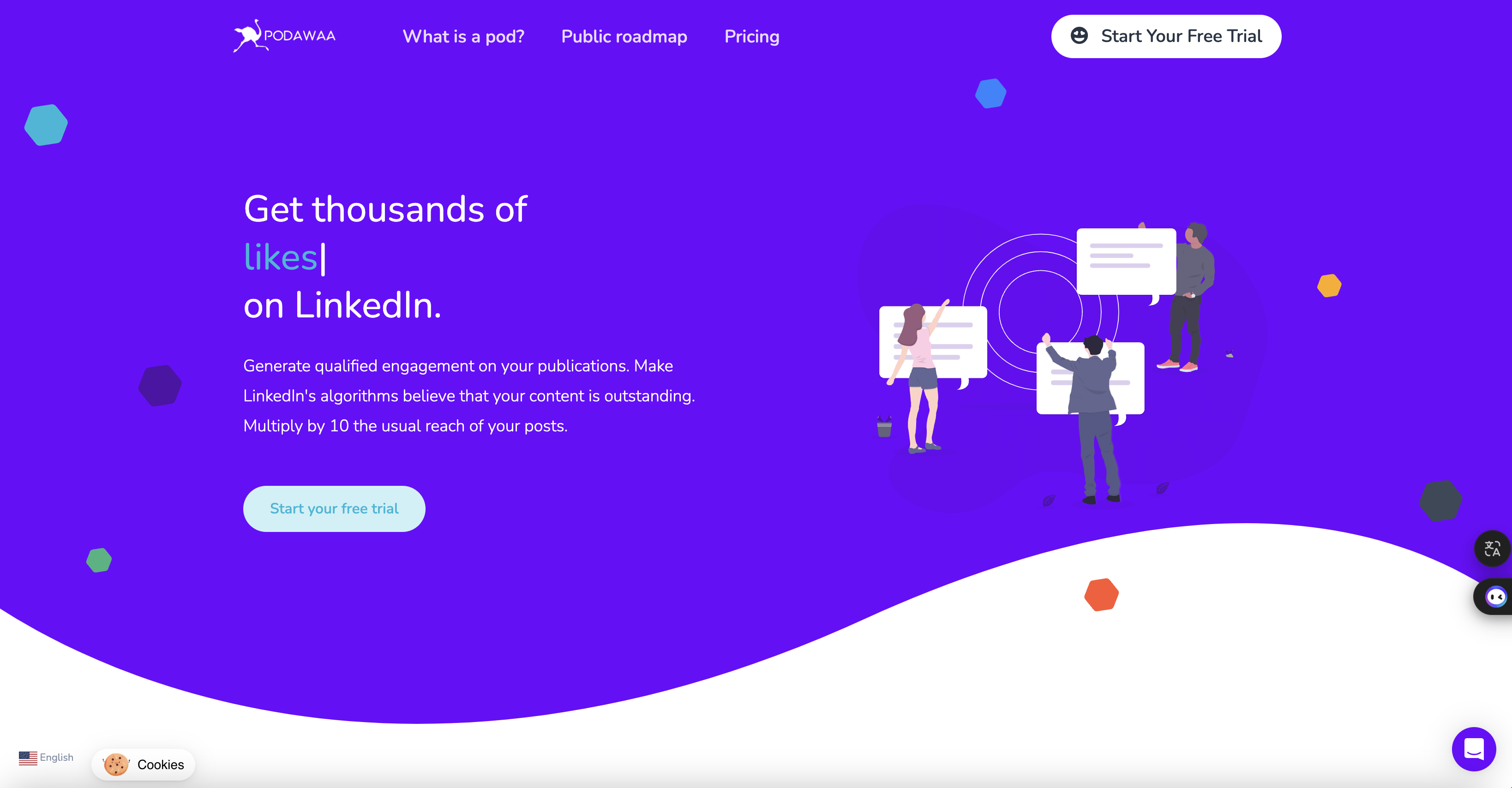
This tool will help you generate faster engagement without making you look like a robot. For example, Podawaa 🪶 allows you to :
- Customize your audience and change pods,
- Generate comments inspired by those frequently used on LinkedIn,
- Prepare and schedule your posts,
- Fully compatible with Waalaxy,
- Simulate human behavior so you don’t get banned from LinkedIn.
#8. Waalaxy, for LinkedIn!
🪐 Waalaxy is a digital marketing tool and CRM, specializing in the automation of multichannel prospecting (LinkedIn + Email Marketing).
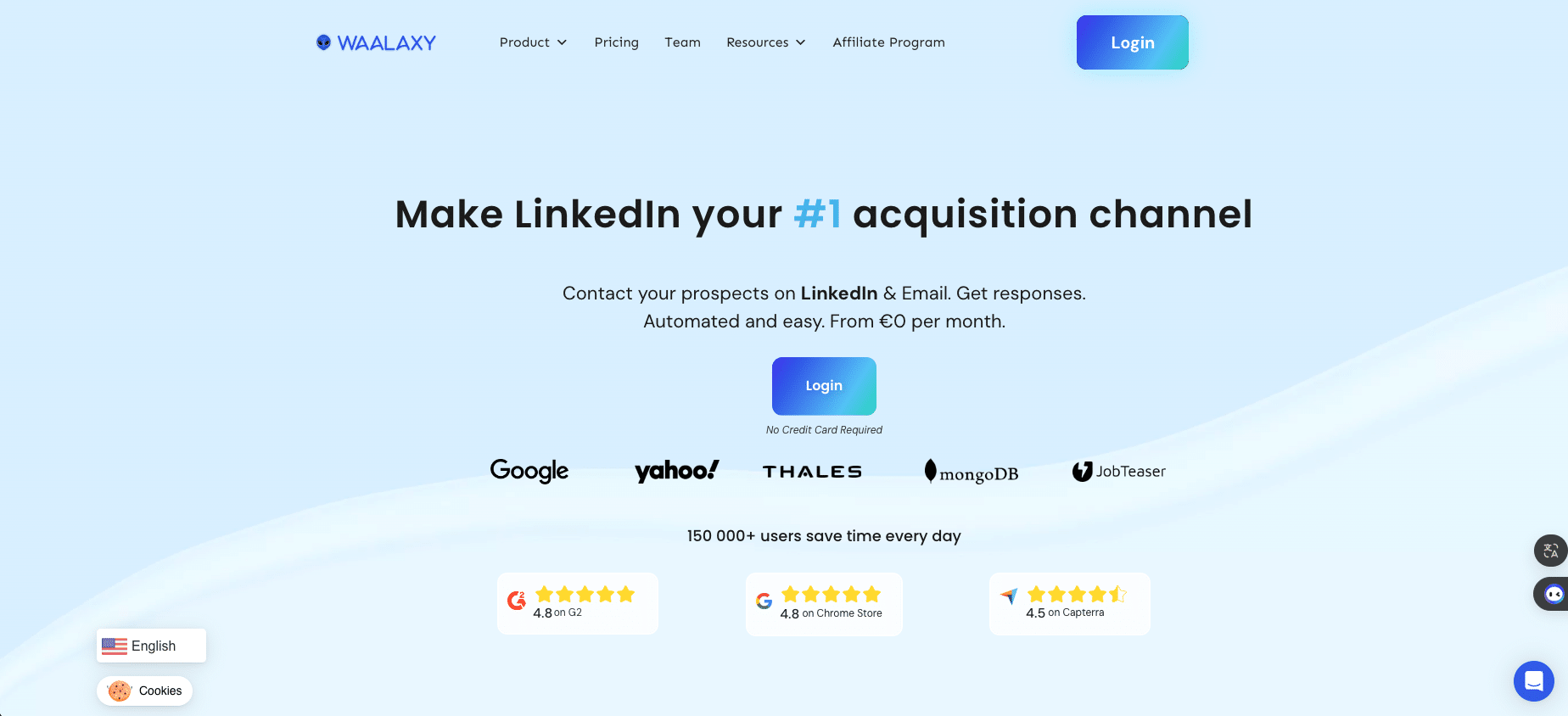 🤑 Waalaxy is a must-have, recommended for its ease of use! ✅ But above all, it’s cheaper than a full-time salesperson and allows you to :
🤑 Waalaxy is a must-have, recommended for its ease of use! ✅ But above all, it’s cheaper than a full-time salesperson and allows you to :
- 🟣 Expand your network to generate opportunities (visits, requests, comments and automatic messages).
- 🟣 Find customers even without technical skills.
- 🟣 Create multichannel campaigns and fully customizable scenarios.
- 🟣 Exclusive features:
- LinkedIn 2.0 or Inbox Waalaxy messaging (with export, pre-recorded replies, ergonomic interface, lead tagging, automatic follow-ups, etc.).
- But also AI Finder, AI Prospect Finder, AI message assistant Waami, Cloud with sequence templates, integration with third-party solutions…
- 🟣 Access advanced analytics on an easy-to-master dashboard.
- 🟣 Be accompanied by responsive support and concrete resources.
In short, among all existing marketing solutions…Waalaxy is indispensable because it’s a solution that adapts to your needs and not the other way around. 🤩
💎 Pro tips – By choosing the Waalaxy and Podawaa duo, you’ll be surprised at how much time you’ll save and how effective your activity will be on LinkedIn.
In short, with this selection, all you have to do is choose the best marketing automation software. Now you’re ready to automate and generate leads much more easily! 🔥
How do I use Waalaxy?
Of course, we’re preaching to the choir… But, at the same time, Waalaxy really is a magical solution for multichannel prospecting. 🧙
The tool is complete, allowing you to import your leads, send personalized messages, find emails, enrich your lists, help you write your messages, manage and qualify leads… 🤩 We don’t know what more you need!
Prospecting message sequences
🤔 If you’ve never used or opened Waalaxy (already, how come?), we’re going to show you step-by-step how to import your contacts and then send them a message :
- Start by opening the Chrome extension (if you’ve downloaded it, that goes without saying).
- Open your LinkedIn application (on a computer).
- Double-click on the magnifying glass in the search bar to access all available contacts.
- Then, filter by “People” and access advanced search filters to add a keyword (such as the job title, here Fullstack Developer).
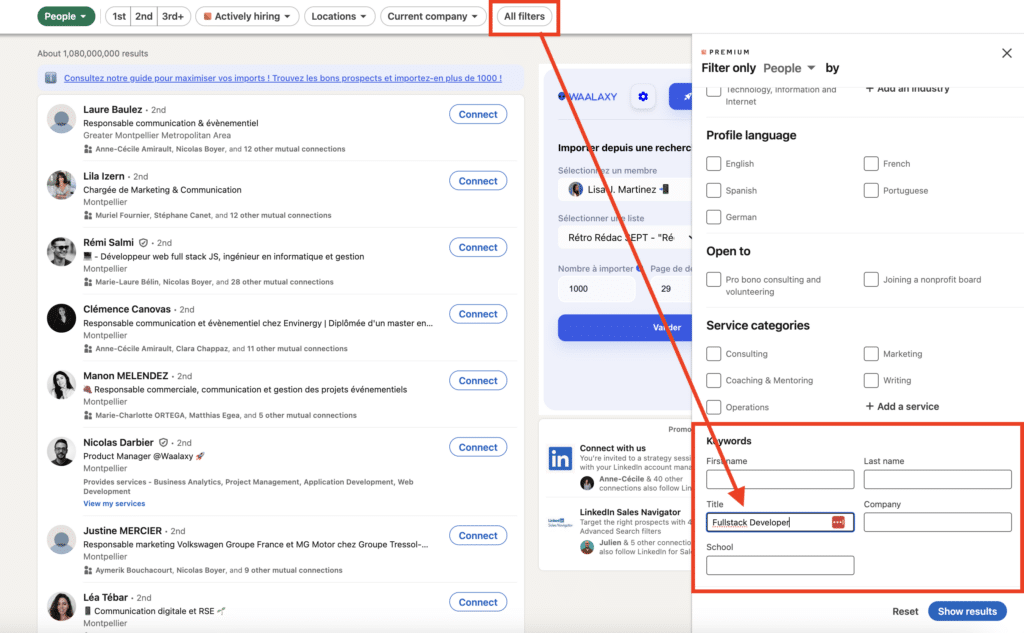
This method is much more effective than a simple keyword search directly typed into the search bar (and even more so if you use Boolean operators).
- Remember to select “people” and the relationship level (because you can only send a message to people in your LinkedIn network).
- Import your contacts into Waalaxy (simply click on the little alien icon and follow the instructions).
- Then go to Waalaxy, click on “Prospects” and select the list you’ve created (so you can see if your contacts have been imported).
- Click on “Start a campaign”.
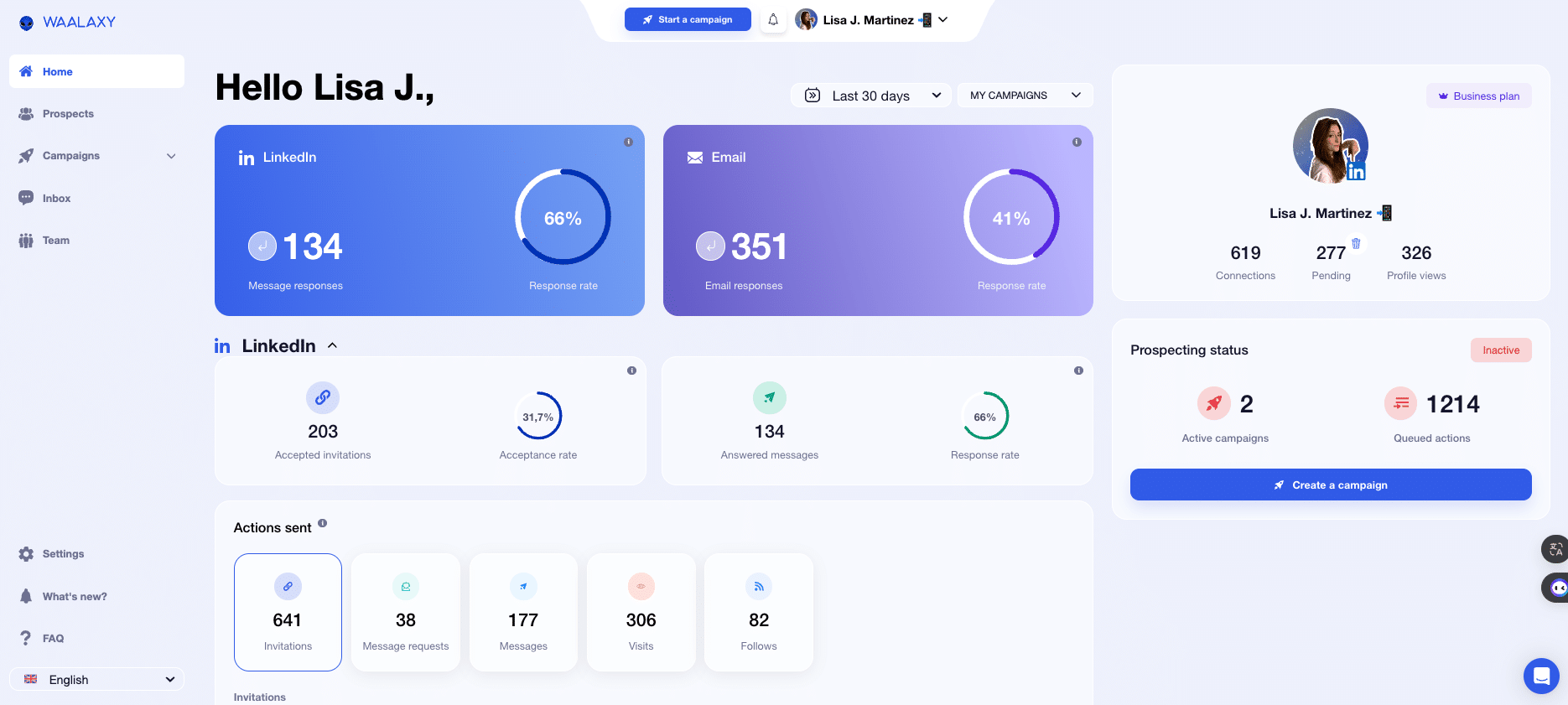
- Choose the “Message” sequence.
- Name your campaign.
- Select “From my lists” and select the list you’ve created to add the desired contacts.
- Name your message template if you wish.
- Launch your campaign.
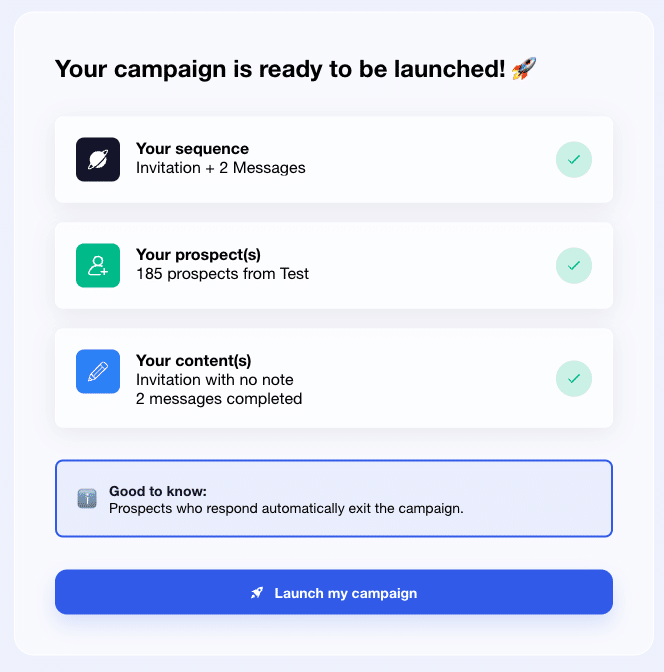
Automation lets you send several messages to different people in a totally personalized way (thanks to the variables available: the person’s first and last name and company).
[maxbutton id=”56″]
As you can imagine, there are many types of automation, apart from those described above…
It can involve sending personalized emails, managing and qualifying prospects ⭐. But, in concrete terms, what does it look like?
We’ll give you a few examples on Waalaxy. 👇🏼
Examples of marketing automation campaigns
Lead generation campaigns
You can also automate your activity on LinkedIn 👤: targeted publications on your profile or company page, with conversion form to encourage prospects to become leads etc.
To generate leads, you can use Waalaxy! 👽
For example, in this sequence, you can find out who a decision-maker is so you can present your offer to them (aimed especially at those who want a B2B target). ⬇️
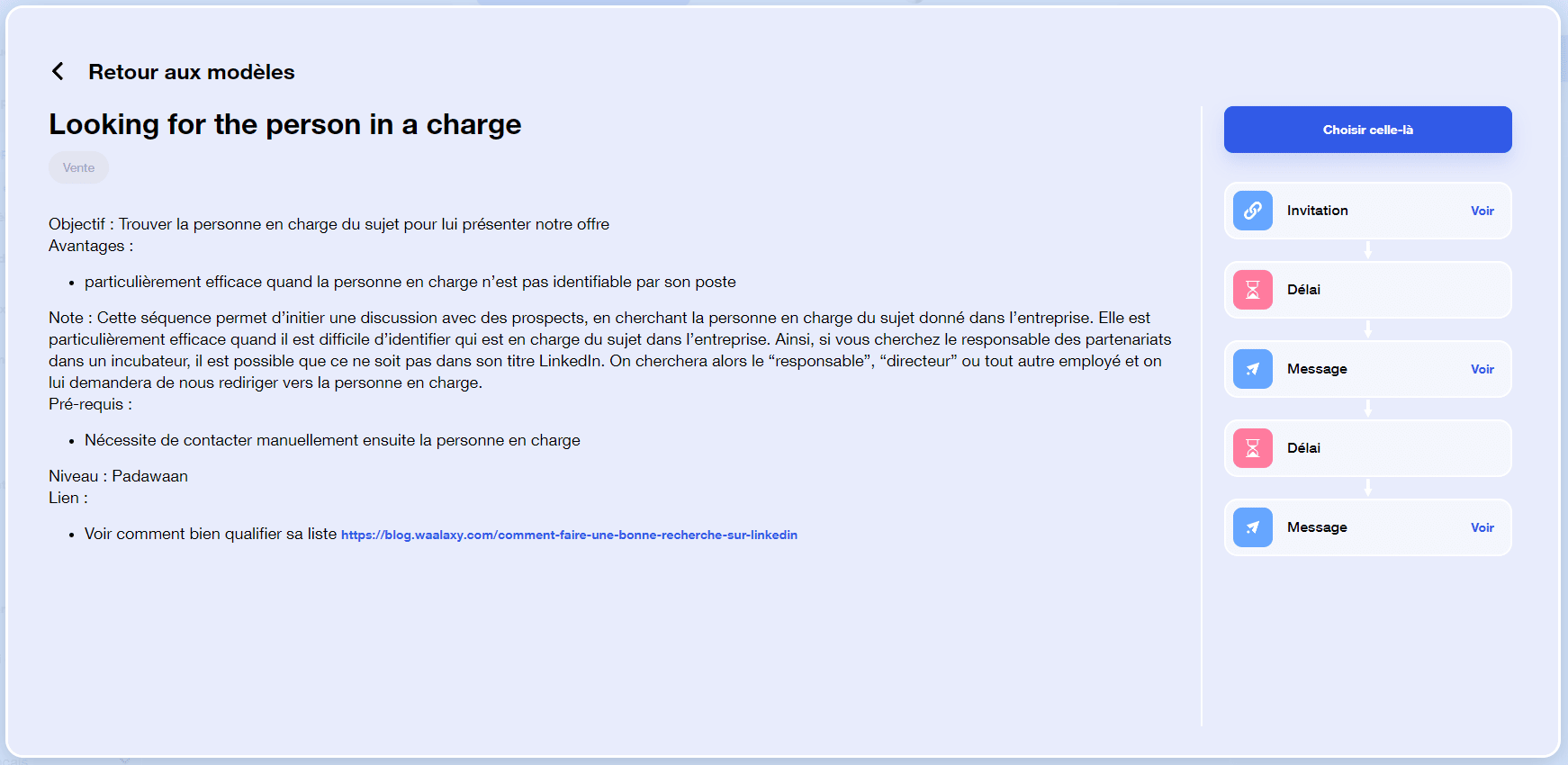
Automated reminder campaigns
Have you ever visited a website, put items in your basket 🛒 and never confirmed your order? 😱
Rest assured, it’s happened at least once, to everyone. Know that marketing automation can help you win back your potential customer. 🫳🏼
Of course, you’ll need to “track” your pages to gather the necessary information. Then you’ll set up your scenario where you can email people who have added items, without validating the order.
The workflow could look like this ⬇️ :

You start the sequence and set the time after which you send an e-mail to the person who has “forgotten” their shopping cart.
These emails can include special offers to entice users to buy, or additional product information to help them make a decision.💰
Lead nurturing campaigns
Lead nurturing campaigns aim to follow prospects along their journey and encourage them to become customers.
This can include scheduled messages with information about products or services, special offers such as Valentine’s Day 💓, Christmas and calls to action to encourage purchase.
Waalaxy knows how to do this very well, so take a look at this example of a promotional campaign on the occasion of its birthday👇.
Conclusion
To conclude, marketing automation represents a significant evolution in the way a brand or group interacts with its prospects and customers. 🫶🏼
🤖 By automation marketing, it simultaneously offers greater efficiency, and more personalized communications, particularly thanks to the functionalities of the solutions offered on the market.
However, it’s essential to note that marketing automation doesn’t entirely replace traditional marketing. The two approaches can complement each other to achieve diversified objectives and maximize the overall impact of marketing campaigns. 🚀
That’s the end 🥹 of this article (well, almost) and we’re going to do a quick recap of what we’ve seen :
- Marketing automation definition.
- The fundamentals of marketing automation.
- The benefits and drawbacks of marketing automation.
- Best practices for getting started with marketing automation.
- Definition, criteria and Top 7 best marketing automation tools to use.
- Using Waalaxy and campaign examples.
Frequently Asked Questions (FAQ)
🏁 Finally, here are the answers to the most frequently asked questions on the subject. 👇🏼
The differences between marketing automation and traditional marketing
Marketing automation and traditional marketing represent two distinct approaches to promoting products and services. While both are crucial to reaching prospects, the key differences are ⬇️:
- Targeted approach: marketing automation enables precise marketing targeting based on behavior and specific interests. Traditional marketing, on the other hand, is generally aimed at a wider audience without the same capacity for personalization.
- Measuring effectiveness: Marketing automation offers precise tracking through metrics such as number of conversions, cost per conversion and click-through rates. In comparison, traditional marketing is often harder to measure due to its more generic campaigns.
- Speed and efficiency: Automation enables rapid adjustments through A/B testing, saving time and resources. In contrast, traditional marketing often requires more time and resources to deploy.
In short, this strategy stands out for its personalization, efficiency and ability to generate adjustments quickly. However, the two approaches can complement each other to optimize results. 🤝
What are the 5 pillars of marketing automation?
The five pillars of marketing automation are essential for building an effective strategy, optimizing marketing processes and achieving business objectives more strategically and profitably. 🎯
Here are the 5 pillars ⬇️ :
- Automating the sending of personalized emails based on user behavior to effectively engage throughout the user journey.
- Lead management: Marketing automation enables leads to be captured, qualified and nurtured in an automated way, gradually guiding them towards conversion.
- Segmentation and targeting: Data collection and behavioral analysis enable audience segmentation, increasing relevance and conversion rates.
- Lead scoring: Evaluate and rank leads according to their level of engagement and buying potential, so that teams can focus their efforts on the most promising leads.
- Analysis and reporting: Marketing automation provides detailed analysis of campaign performance, enabling marketers to analyze and optimize results, and make informed decisions.
What is a “Workflow”?
A workflow in marketing automation is a defined process that automates repetitive tasks. 🔄
It’s a set of actions triggered by specific events (form filling, email opening, cart abandonment…). This makes it possible to track and interact with customers throughout their journey. 💬
Workflows are often built from marketing automation software and can be customized to meet the needs you have.
You’ll be able to create personalized customer experiences 💘 for each customer and track your results accurately. You’ll also save time and resources, so you can focus on strategic missions.
That’s the end of this guide, and you’re now in the know about marketing automation! See you soon! 👽


